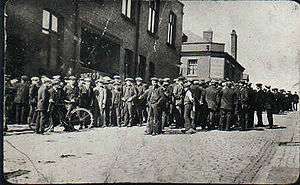Collective action in the United Kingdom
Collective action in the United Kingdom in UK labour law is the main support for collective bargaining. Although the right to strike (or "industrial action" traditionally) has attained the status, since 1906, of a fundamental human right, protected in domestic case law, statute, the European Convention on Human Rights and international law, the rules primarily codified in the Trade Union and Labour Relations (Consolidation) Act 1992 have generated significant litigation. In order for a group of workers to take strike action, they must,
- hold a ballot of the workforce who will go on strike
- inform the employer of the timing and duration of the strike
- not conduct the industrial action for a purpose unrelated to terms and conditions of the workers' employment contract
- not take industrial action against anyone but the employer of the affected workers
- remain peaceful when conducting picket lines
The consequence for breach of these rules is that a trade union will be liable for damages to the employer for the cost of the industrial action, and that an injunction may be issued against the industrial action going ahead. The rules on industrial action in the UK have been called the toughest in the Western World, and subject to heavy criticism from the International Labour Organisation and led to violations in the European Court of Human Rights.
History
- Economic tort
- Taff Vale Railway Co v Amalgamated Society of Railway Servants
- Quinn v Leatham [1901] AC 495
- South West Trains
- Trade Disputes Act 1906
- Torquay Hotels Ltd v Cousins [1968]
- Rookes v Barnard [1964] AC 1129
Right to strike
- Morgan v Fry [1968] 2 QB 710, Lord Denning MR says there has been a right to strike in the UK for over 60 years provided proper notice is given; cf Metrobus Ltd v Unite [2009] EWCA Civ 2009
- In re P [2003] UKHL 8
- Demir and Baykara v Turkey [2008] ECHR 1345
- British Airways plc v Unite the Union (No 2) [2010] IRLR 809
- Industrial Relations Act 1971, repealed by
- Trade Union and Labour Relations Act 1974, amended by
- Employment Act 1982
- Trade Union and Labour Relations (Consolidation) Act 1992
- Wilson and Palmer v United Kingdom [2002] IRLR 568 in the EHCR[1]

Economic torts
- Lumley v Gye (1853) 2 E. & B. 216
- Allen v Flood [1898] AC 1
- Taff Vale Railway Co v Amalgamated Society of Railway Servants [1901] AC 426,
- Quinn v Leatham [1901] AC 495
- South Wales Miners' Federation v Glamorgan Coal Co [1905] AC 239
- Hill v CA Parsons & Co [1972] where the cause of the dispute was a union attempting to enforce a closed shop
- Common law right?
- Crofter Hand Woven Harris Tweed v Veitch [1942] AC 435
- Morgan v Fry [1968] 2 QB 710, Lord Denning MR says there has been a right to strike in the UK for over 60 years provided proper notice is given
- London Underground Ltd v RMT [1996] ICR 170
- Wilson and Palmer v United Kingdom [2002] IRLR 568 in the ECHR
- Immunity
- Trade Disputes Act 1906 and TULRCA 1992 s 219
- Stratford (JT) & Son Ltd v Lindley [1965] AC 269
- Rookes v Barnard [1964] AC 1129
- Torquay Hotel Co Ltd v Cousins [1969] 2 Ch 106
- Merkur Island Shipping Corporation v Laughton [1983] 2 AC 570
- Barretts & Baird (Wholesale) Ltd v IPCS [1987] IRLR 3
- Falconer v NUR [1986] IRLR 331, rail passenger gets £173 damages for strike without ballot
- TULRCA 1992 s 244, meaning of trade dispute
- Express Newspapers Ltd v Keys [1980] IRLR 247
- BBC v Hearn [1977] 1 WLR 1004
- Dimbleby & Sons Ltd v NUJ [1984] ICR 386, corporate veil precludes strikes against parent
- Mercury Communications Ltd v Scott-Garner [1984] Ch 37, no strike against potential takeover bidder
- University College London Hospitals NHS Trust v UNISON [1999] ICR 204, no strike against privatisation policy
Secondary action and company groups
- TULRCA 1992 s 224, secondary action not protected
- Quinn v Leatham [1901] AC 495, secondary action disapproved
- DC Thomson & Co Ltd v Deakin [1952] Ch 646
- Conway v Wade [1909] AC 506, judicial approval of secondary action
- Express Newspapers Ltd v MacShane [1979] ICR 210
- Duport Steels Ltd v Sirs [1980] ICR 161, secondary action capable of legitimacy
- TULRCA 1992 s 222, no closed shop strikes
- TULRCA 1992 s 223, no strikes to support unlawful strikes
Balloting
- TULRCA 1992 s 226-234A, ballots, notice and costs
- RMT v London Underground Ltd [2001] IRLR 228, notice to employer
- RJB Mining (UK) Ltd v NUM [1995] IRLR 813
- Monsanto plc v TGWU [1987] ICR 269, new ballot not needed when strike suspending to let negotiations continue, a "matter of fact and degree"
Picketing
- TULRCA 1992 s 220, peaceful picketing is allowed; s 241, immunity from various torts
- Highways Act 1980 s 137, Public Order Act 1986 s 14, Police and Criminal Evidence Act 1986 s 25, Police Act 1996 s 89, Conspiracy, and Protection of Property Act 1875 s 7
- Rayware LTD v TGWU [1989] ICR 457
- Mersey Dock & Harbour Co v Verrinder [1982] IRLR 152, picket against drivers reaching docks an improper purpose
- Broome v DPP [1974] AC 587, standing in road not persuasion but compulsion under HA 1980 s 137
- Piddington v Bates [1961] 1 WLR 162, police judgment about picket numbers is subjective
- Moss v McLachlan [1985] IRLR 76, police can block roads to pickets to preserve peace
Injunctions
- TULRCA 1992 s 221, injunctions
- Richard Read v NUM
- Boxfoldia
- P&O v Byrne
See also
Notes
- ↑ The ECtHR's press release
External links
- The Trades Union Congress website website
